Ghassan M. Kraidy
Asymmetric Modulation Design for Fluid-Antenna SWIPT Systems
Sep 09, 2025Abstract:In this work, we propose the design of modulation schemes that improve the rate-energy region of fluid antenna-assisted simultaneous wireless information and power transfer (SWIPT) systems. By considering the nonlinear characteristics of practical energy harvesting circuits, we formulate a dual-objective rate-energy (RE) region optimization problem to jointly maximize the discrete-input mutual information (DIMI) and harvested current. The problem is solved using the epsilon-constraint method and optimized constellations are designed for various energy harvesting thresholds. We then evaluate the performance of the optimized constellations under three different fluid antenna (FA) port selection strategies: (i) Best Port, (ii) Fixed Port, and (iii) Random Port. Our simulation results demonstrate significant performance gains of optimized constellations over conventional constellations in both information rate and energy harvesting.
Spatial Modulation with Energy Detection: Diversity Analysis and Experimental Evaluation
Sep 08, 2023
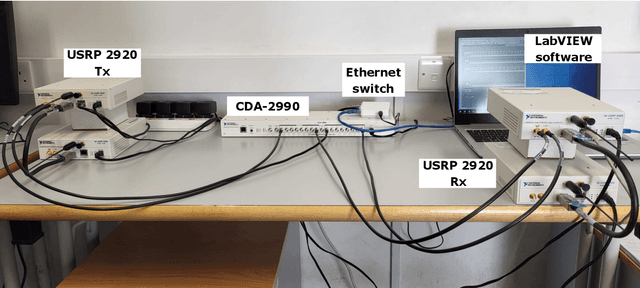
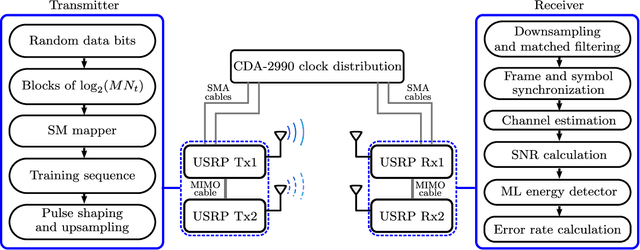
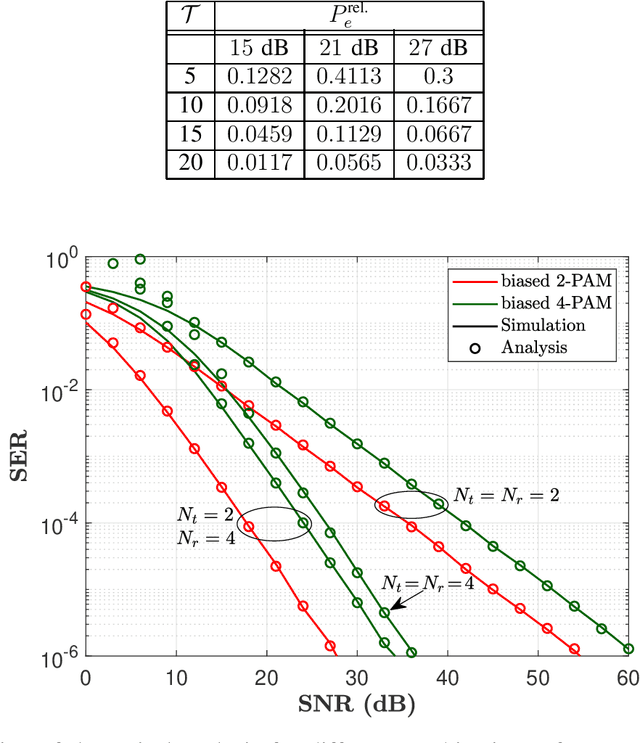
Abstract:In this paper, we present a non-coherent energy detection scheme for spatial modulation (SM) systems. In particular, the use of SM is motivated by its low-complexity implementation in comparison to multiple-input multiple-output (MIMO) systems, achieved through the activation of a single antenna during transmission. Moreover, energy detection-based communications restrict the channel state information to the magnitude of the fading gains. This consideration makes the design applicable for low-cost low-powered devices since phase estimation and its associated circuitry are avoided. We derive an energy detection metric for a multi-antenna receiver based on the maximum-likelihood (ML) criterion. By considering a biased pulse amplitude modulation, we develop an analytical framework for the SM symbol error rate at high signal-to-noise ratios. Numerical results show that the diversity order is proportional to half the number of receive antennas; this result stems from having partial receiver channel knowledge. In addition, we compare the performance of the proposed scheme with that of the coherent ML receiver and show that the SM energy detector outperforms its coherent counterpart in certain scenarios, particularly when utilizing non-negative constellations. Ultimately, we implement an SM testbed using software-defined radio devices and provide experimental error rate measurements that validate our theoretical contribution.
Outage and DMT Analysis of Partition-based Schemes for RIS-aided MIMO Fading Channels
May 07, 2023Abstract:In this paper, we investigate the performance of multiple-input multiple-output (MIMO) fading channels assisted by a reconfigurable intelligent surface (RIS), through the employment of partition-based RIS schemes. The proposed schemes are implemented without requiring any channel state information knowledge at the transmitter side; this characteristic makes them attractive for practical applications. In particular, the RIS elements are partitioned into sub-surfaces, which are periodically modified in an efficient way to assist the communication. Under this framework, we propose two low-complexity partition-based schemes, where each sub-surface is adjusted by following an amplitude-based or a phase-based approach. Specifically, the activate-reflect (AR) scheme activates each sub-surface consecutively, by changing the reflection amplitude of the corresponding elements. On the other hand, the flip-reflect (FR) scheme adjusts periodically the phase shift of the elements at each sub-surface. Through the sequential reconfiguration of each sub-surface, an equivalent parallel channel in the time domain is produced. We analyze the performance of each scheme in terms of outage probability and provide expressions for the achieved diversity-multiplexing tradeoff. Our results show that the asymptotic performance of the considered network under the partition-based schemes can be significantly enhanced in terms of diversity gain compared to the conventional case, where a single partition is considered. Moreover, the FR scheme always achieves the maximum multiplexing gain, while for the AR scheme this maximum gain can be achieved only under certain conditions with respect to the number of elements in each sub-surface.
* 13 pages, 9 figures
On the Diversity and Coded Modulation Design of Fluid Antenna Systems
May 04, 2022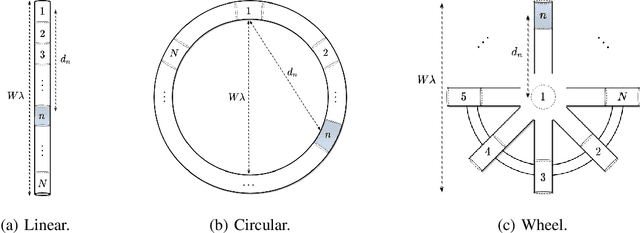
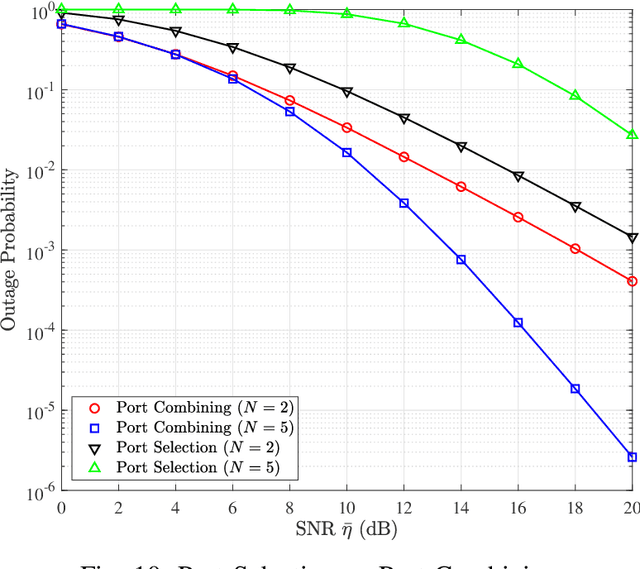

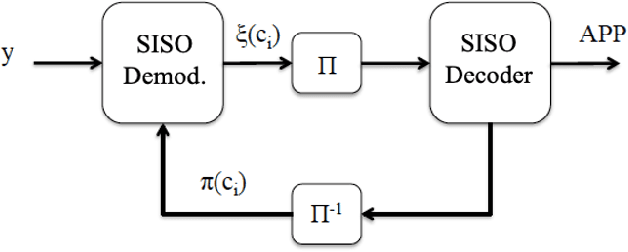
Abstract:Reconfigurability is a desired characteristic of future communication networks. From a transceiver's standpoint, this can be materialized through the implementation of fluid antennas (FAs). An FA consists of a dielectric holder, in which a radiating liquid moves between pre-defined locations (called ports) that serve as the transceiver's antennas. Due to the nature of liquids, FAs can practically take any size and shape, making them both flexible and reconfigurable. In this paper, we deal with the outage probability of FAs under general fading channels, where a port is scheduled based on selection combining. An analytical framework is provided for the performance with and without estimation errors, as a result of post-scheduling delays. We show that although FAs achieve maximum diversity, this cannot be realized in the presence of delays. Hence, a linear prediction scheme is proposed that overcomes delays and restores the lost diversity by predicting the next scheduled port. Moreover, we design space-time coded modulations that exploit the FA's sequential operation with space-time rotations and code diversity. The derived expressions for the pairwise error probability and average word error rate give an accurate estimate of the performance. We illustrate that the proposed design attains maximum diversity, while keeping a low-complexity receiver, thereby confirming the feasibility of FAs.
 Add to Chrome
Add to Chrome Add to Firefox
Add to Firefox Add to Edge
Add to Edge